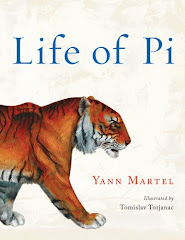
What is gained or lost in studying a work of fiction alongside a historical unit of study? For example, is it beneficial to watch/read a fictitious movie/book such as, "The Other Boleyn Girl" while you are studying the history of British rule? Many universities are pushing this type of education. Do you agree with it? (for those of you who don't know, Anne Boleyn was the second wife of Henry VIII. She was sentenced to death and beheaded by her husband- The King of England. She had a sister who was rumored to be one of the Kings mistresses around the same time)




12 comments:
I think that this could be helpful in the sense that it would give you a very different perspective on the history that you are studying. I believe you would have to be cautious, as what you were reading/watching may not be entirely true, but none the less, it may help you open up to the lessons and take a very different view on what you are learning. When you have a story to relate to it, you tend to just want to know more and dig deeper and deeper. Especially if you get wrapped up in the characters and the plot.
I think it is a very useful tool.
You can describe in perfect detail the life of a peasant all you want, but until the reader makes a connection to the peasant, the reader will feel no real connection.
Connections allow for active thinking! (sorry, I couldn't help it)
During your studies it may become confusing to which is which. If your English class was reading a book and your Socials class was doing a history lesson, the English class may benefit from it because it would give you a sense of the time for the setting, but with the SS class you may mix up the fiction and the non-fiction facts of each.
I don't know about everyone else, but I find that the non-fiction material that we study in school is often dry and boring. Using fictional books to study something helps greatly to keep the focus of the students on the subject. If you stick a text book in front a teen they are much likely to set it aside then an interesting novel, even if it is fiction.
I think fictional readings would help with historical learning, but it might confuse the student. It would be very easy to mix up the facts and the fiction. I think that fiction books would be helpful because books are usually able to take you into different times. You get a better understanding of the lives of those in history.
I can see how reading fictional books about history can help educate you on topics that you're learning in school. I think it depends on having a good source of how the author writes and if he has good resources. The fictional book may have some facts about happening in real life, it's all in how you incorperate it. I agree with kar saying how reading fiction books may help you understand the lives of those in history.
My answer can be found here
Although it may be a useful tool for teaching, I don't know if I would want university graduates to have learned through this aspect. A lot of people find it very difficult to separate fact from fiction in such cases; they hear one thing, and although it may have certain aspects of truth to it, it has been twisted in order to create a new concept. This was of teaching history and facts does, to an extent, allow for further insight into the subject area, it also increases the fictitious content being absorbed by the studiers. In time, this may result in much of the "true" history to become less widely known, and create new, "untrue" historical events and occurrences.
I think that studying fact through fiction can be great, as long as it's not the only place where you're getting your information. Not only does fiction allow the reader to become more interested, but they're also able to empathize with the characters and fit in with the situations. Another important thing is comparing and contrasting what's fiction and what's fact in the novel, and then learning from that.
As long as the reader knows that not everything is necessarily truthful, I think that fiction can be helpful. Sometimes it's fairly obvious to tell apart fact from fiction, so it's not very harmful. For example, the animated movie Anastasia, which is probably the least factual movie I've ever seen. Besides the fact that even most of the historical parts of the story weren't true, I doubt anyone would actually believe that Rasputin was living beneath the Earth with a pet bat :P However, the story is still amusing... for children, and not university students. That being said, some works of fiction are more reliable than others. I'll leave it at that.
I believe that it is beneficial because it gives the reader a visual of history, in a sense, rather than just reading about it. (like crls spncr said they are able to make a connection easier.)
I think that movies, depending on how accurate they are, could help people understand the lifestyle of historical times. If certain stories are acted out then people can relate to how different things were back then. Sometimes people don't truly understand something until they are given an example.
Going back to what adam said about not wanting university students to learn through reading fictional books. I think there is a difference in the fact that generally speaking if you are taking a post secondary course, you probably want to be there. Therefore a professor shouldn't have to use a fictional book to keep the attention of his/her students.
Post a Comment